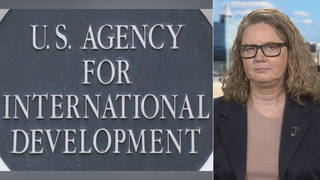U.S. Humanitarianism Often Reproduces Inequality, But Killing USAID Is Wrong Answer: Kathryn Mathers

Amid ongoing chaos and outrage stemming from the Trump administration's gutting of the U.S. Agency for International Development, we hear a critique of USAID and the humanitarian-industrial complex" from South African anthropologist Kathryn Mathers. "USAID is very much a part of a system and industry that not only depends on global inequality ... but in many ways produces it," she says. Funding for foreign assistance, much of which actually flows back to the United States, ultimately does its job of supporting U.S. interests" and renders the causes of global inequality invisible, hiding the ways that often U.S. policies, U.S. trade agreements and other forms of extractive capitalism are often the causes." Mathers emphasizes, however, that Trump's abrupt cuts to the agency, rather than resolving the paradox" of humanitarian aid, are doing only harm."